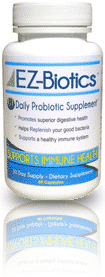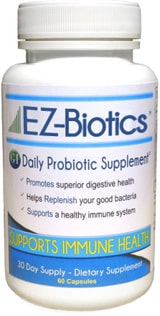


HELP SUPPORT YOUR IMMUNE SYSTEM EVERY DAY!
#1 BEST SELLER – 3 YEARS IN A ROW!
-
- Doctor Recommended
-
- Made in the USA
-
- Vegetarian Friendly*
-
- Dairy free for the Lactose Intolerant

The Breakdown
MULTI-STRAIN - 93%
POTENCY (10 BIL CFU) - 100%
LACTOSE FREE - 100%
VEGETARIAN FRIENDLY - 100%
SAFE FOR ADULTS & CHILDREN - 100%
STABLE AT ROOM TEMP - 89%
97%
BEST!
10 BILLION GOOD PROBIOTIC BACTERIA IN 7 STRAINS RANKS EZBIOTICS OUR EDITORS CHOICE FOR 2014
” I recently had to be on a several week course of antibiotics. I took EZbiotics everyday. Not only did I NOT have any type of GI side effects from the antibiotics, I was able to completely eliminate my use of lactase enzyme! Now I take EZBiotics everyday and eat whatever I want without worrying about lactase pills! What a pleasure. EZBiotics is the real deal! Thank you. “ – DR. Reuben P. Weiss, MD
* These products are not intended to diagnose, treat, cure, or prevent any diseases. Individual results may vary |
Why EZBiotics™ is right for you?
EZBiotics™ is probiotic perfection! Each scientifically selected strain is the culmination of thousands of hours of research and analysis. Designed for superior promotion of immune system and digestive health, EZBiotics™ probiotic supplement contains 7 unique bacteria strains all working in perfect harmony to help you achieve maximum results.
You no longer need to ‘guess’ which probiotic will work best for you as EZBiotics™ is works hard to help you achieve your goals and support the relief you strive for.
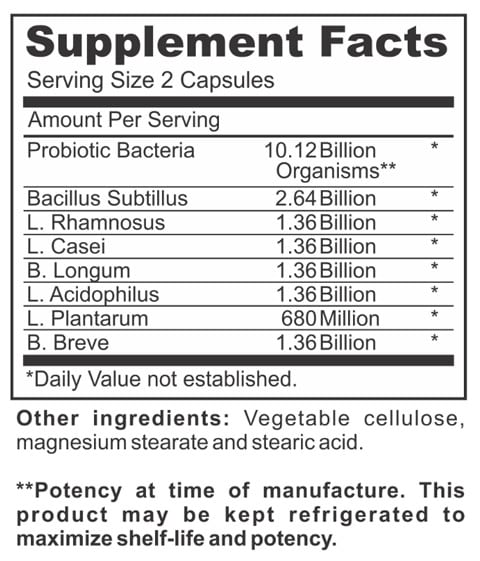
| Finally, a probiotic you can count on. |
| Powerful Vital Support for Your Immune Health A Multi-Strained Probiotic that Works with You Helps replenish your body’s good bacteria Promote vaginal health (women) Help support balanced intestinal microflora Powerful support for your immune system Superior to most yogurts which are pasteurized (heated to kill bacteria) |

| EZBIOTIC’S POWERFUL INGREDIENTS |
| What the Media is saying about EZBiotics™ Ingredients. |
 Woman’s Day© magazine discusses the ingredient in EZBiotics™ titled “10 All-Natural Allergy Remedies Ease seasonal sniffling and sneezing”.
Woman’s Day© magazine discusses the ingredient in EZBiotics™ titled “10 All-Natural Allergy Remedies Ease seasonal sniffling and sneezing”. NBC story covers Lactobacillus acidophilus, a component of EZBiotics™, in a report titled “Tired? Depressed? It may be hidden allergies. Fend off headaches, yeast infections and possibly depression”
NBC story covers Lactobacillus acidophilus, a component of EZBiotics™, in a report titled “Tired? Depressed? It may be hidden allergies. Fend off headaches, yeast infections and possibly depression” AARP© magazine reports data on acidophilus in titles “Probiotics Help Prevent Antibiotic-Related Diarrhea”
AARP© magazine reports data on acidophilus in titles “Probiotics Help Prevent Antibiotic-Related Diarrhea” Prevention© magazine reports on probiotic combination including l. longum, in EZBiotics™, Beat Your Belly With … Bugs? The latest weapon for your weight loss arsenal”
Prevention© magazine reports on probiotic combination including l. longum, in EZBiotics™, Beat Your Belly With … Bugs? The latest weapon for your weight loss arsenal”  Readers Digest© on the components of EZBiotics™ “…these healthy bacteria can help”..“Easing diarrhea” “Preventing infection” and “Probiotics may help people with irritable bowel syndrome, Crohn’s disease or ulcerative colitis.”
Readers Digest© on the components of EZBiotics™ “…these healthy bacteria can help”..“Easing diarrhea” “Preventing infection” and “Probiotics may help people with irritable bowel syndrome, Crohn’s disease or ulcerative colitis.” Mens Health© Magazine article “The Germs That Are Good for Your Heart” on – L. acidophilus, a component in EZBiotics™. and how you “gut” can influence everything from allergies to knee pain to sex”
Mens Health© Magazine article “The Germs That Are Good for Your Heart” on – L. acidophilus, a component in EZBiotics™. and how you “gut” can influence everything from allergies to knee pain to sex”
| REAL PEOPLE, REAL RESULTS |
I feel awesome!* “If you are experiencing some chronic intestinal-related discomfort, I recommend giving these EZbiotics™ capsules a try. It’s the same concept as those probiotic fortified yogurts but way easier to take, because people with tummy problems often have lactose/dairy intolerance and can’t eat yogurt. I’ve been taking these probiotics for almost 2 weeks now and have definitely noticed a difference. “
LAURA B. (MIAMI, FL)
*I just found out about these* “I haven’t been having uncomfortable food/intestinal reactions, and without getting into too many details, visiting the bathroom these days is practically something I don’t dread anymore. I feel “regular” and “balanced” for the first time in many months and have a feeling that I had too much bad intestinal bacteria. These probiotics seem to be doing the trick for me. I hope they work for you, too, because it’s no fun to be bloated and gassy all day long!! “
C, LEE. (SAN DIEGO, CA)
*Best probiotic on the market!* “I have tried a few other probiotic brands/formulas with pretty much no results whatsoever. I have taken EZBiotics™ for almost 30 days and have seen a dramatic improvement in my regularity! My doctor recommended a high-fiber diet and along with these probiotics, my gas and bloating has all but been eliminated. I have increased my dose from 2 a day to 4 and will stay on that regime for a while, then slowly decrease. “
JARED, T. (PITTSBURGH, PA)
I couldn’t be more pleased!* “I highly recommend this product to help support controlling yeast in the digestive tract. It has been very helpful for me in supporting the prevention of yeast and urinary infections. “
CLAIRE, M. (FORT WORTH, TX)
I was amazed!* “I have been taking EZBiotics for 3 weeks now and I have no complaints I have not been sick at all! Well I do still have my seasonal allergies but that’s nothing new! These got put to the test when both of my boys picked up a stomach bug from daycare. They both had vomiting, diarrhea, and fevers for 4 days straight. Of course I am mom so I was on cleanup detail the whole time. Normally I would have caught this by day 2 but I never got the bug!!! I was amazed!”
Nancy B. (TN)
* These products are not intended to diagnose, treat, cure, or prevent any diseases. Individual results may vary
Do I need a probiotic?
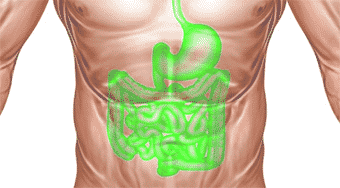 Whether you are trying to support your immune system or need to supplement your probiotic intake for other reasons, a daily probiotic can help support you in many ways. 70% of your immune systems resides in your gut (GI Tract) so it’s important to help support your overall balance since there are a multitude of reasons why your good bacteria flora (probiotic’s) may become depleted.
Whether you are trying to support your immune system or need to supplement your probiotic intake for other reasons, a daily probiotic can help support you in many ways. 70% of your immune systems resides in your gut (GI Tract) so it’s important to help support your overall balance since there are a multitude of reasons why your good bacteria flora (probiotic’s) may become depleted.
Age, diet, illness, infections, stress and lack of exercise all play a role in effecting the healthy flora residing in your gut. Probiotics are great tools to help support a healthy immune system, help replenish your crucial ‘good’ bacteria and promote optimal digestive health.
Are probiotics like EZBiotics™ safe?
What are the benefits of using EZBiotics™?
 With hundreds of brands of probiotics on the market, choosing the right one can be like finding a needle in a haystack. There are brands that include only (1) strain of probiotics and others contain a multitude of different bacteria. Some products contain a potency count as low as 1 billion bacteria while others push the limits past 100 billion! Others require special handling and need to be refrigerated to assure quality. Weeding through this maze can be a daunting task, however, Harvard Heath Watch recommends a daily probiotic supplement contain between 1 and 10 billion bacteria. EZBiotics™ is multi-strained and contains 10 billion bacteria in each dose. Also, refrigeration is not necessary!
With hundreds of brands of probiotics on the market, choosing the right one can be like finding a needle in a haystack. There are brands that include only (1) strain of probiotics and others contain a multitude of different bacteria. Some products contain a potency count as low as 1 billion bacteria while others push the limits past 100 billion! Others require special handling and need to be refrigerated to assure quality. Weeding through this maze can be a daunting task, however, Harvard Heath Watch recommends a daily probiotic supplement contain between 1 and 10 billion bacteria. EZBiotics™ is multi-strained and contains 10 billion bacteria in each dose. Also, refrigeration is not necessary! Is this Supplement Manufactured in the USA and FDA Compliant?

Can I take EZBiotics™ with my vitamins and other supplements?
When should I take my probiotics and do they need to be refrigerated?
* These products are not intended to diagnose, treat, cure, or prevent any diseases. Individual results may vary
Frequently Asked Questions
Do I need a probiotic?
 Whether you are trying to support your immune system or need to supplement your probiotic intake for other reasons, a daily probiotic can help support you in many ways. 70% of your immune systems resides in your gut (GI Tract) so it’s important to help support your overall balance since there are a multitude of reasons why your good bacteria flora (probiotic’s) may become depleted.
Whether you are trying to support your immune system or need to supplement your probiotic intake for other reasons, a daily probiotic can help support you in many ways. 70% of your immune systems resides in your gut (GI Tract) so it’s important to help support your overall balance since there are a multitude of reasons why your good bacteria flora (probiotic’s) may become depleted.
Age, diet, illness, infections, stress and lack of exercise all play a role in effecting the healthy flora residing in your gut. Probiotics are great tools to help support a healthy immune system, help replenish your crucial ‘good’ bacteria and promote optimal digestive health.
Are probiotics like EZBiotics™ safe?
Most probiotics are 100% perfectly safe for you and your family. The ‘friendly’ bacteria are considered completely safe and are non-pathogenic, meaning they are not capable of inducing disease. The normal adult digestive tract contains over 400 different types of probiotic bacteria that reduce the growth of harmful bacteria and promote a healthy digestive system.
Probiotics are found naturally in many foods such as yogurt, dark chocolate, honey and pickles. Also, various soft cheeses such as Gouda, some fruits like bananas and tomatoes and vegetables including artichokes, green beans and leeks all too contain probiotics. While some breads contain probiotic bacteria strains, many also contain gluten which is becoming a chronic problem for many people due to changes in the way our foods are manufactured and genetically modified.
It’s important to remember that anyone considering adding a supplement to their daily routine should of course always consult with a physician.
What are the benefits of using EZBiotics™?

With hundreds of brands of probiotics on the market, choosing the right one can be like finding a needle in a haystack. There are brands that include only (1) strain of probiotics and others contain a multitude of different bacteria. Some products contain a potency count as low as 1 billion bacteria while others push the limits past 100 billion! Others require special handling and need to be refrigerated to assure quality.
Weeding through this maze can be a daunting task, however, Harvard Heath Watch recommends a daily probiotic supplement contain between 1 and 10 billion bacteria.
EZBiotics™ is multi-strained and contains 10 billion bacteria in each dose. Also, refrigeration is not necessary!
Is this Supplement Manufactured in the USA and FDA Compliant?

Can I take EZBiotics™ with my vitamins and other supplements?
Yes, it’s perfectly fine to take probiotics along with other vitamins and supplements. You can take them with medications too, but always check with your healthcare provider first.
When taking probiotics while on an antibiotic (often very detrimental to probiotics) it’s best to take them at different times. And, although quality probiotics generally don’t cause diarrhea, bloating or gas, these symptoms may occur for a few days while your body becomes accustomed to your new probiotics.
When should I take my probiotics and do they need to be refrigerated?
Adults should take 2 capsules early in the morning or 45 minutes before your first meal. You can also take them 1 to 2 hours after your last meal in the evening. Children can take at the same times but at the suggested dose of 1 capsule each day.
Unlike some other brands, EZBiotics™ does not require refrigeration and should be stored in a cool, dry area to prevent condensation. However, they can be stored in your refrigerator to enhance potency retention.
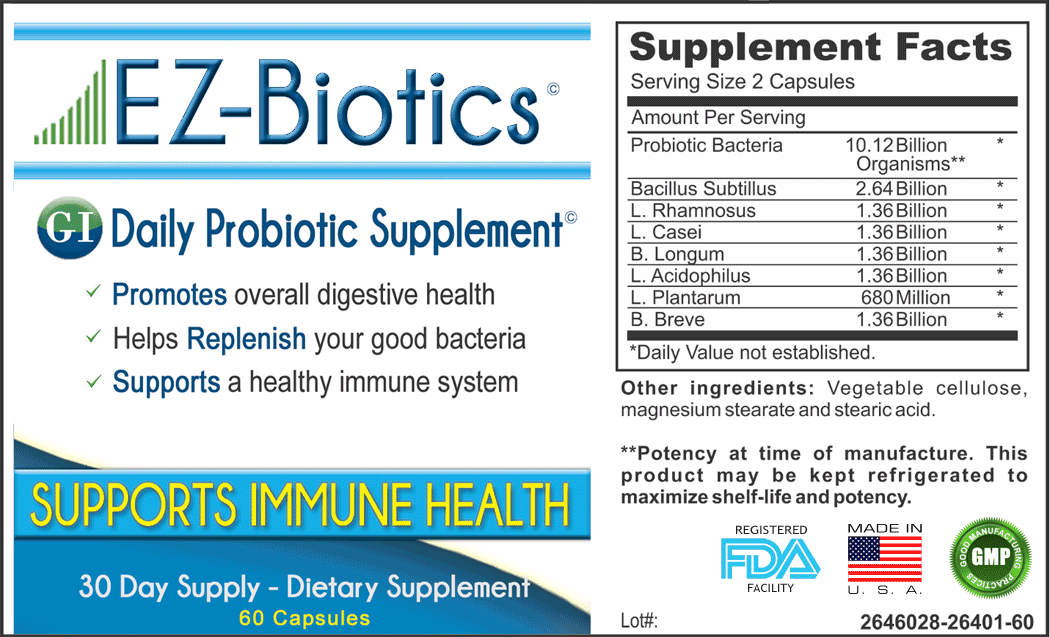
Acidophilus (Lactobacillus acidophilus)
- 1http://www.mayoclinic.com/health/lactobacillus/NS_patient-acidophilus
Bifidobacterium Breve
- 1Björkstén B, Sepp E, Julge K, Voor T, Mikelsaar M (October 2001). “Allergy development and the intestinal microflora during the first year of life”. The Journal of Allergy and Clinical Immunology 108 (4): 516–20.
- 2Correa, Naflesia B. O MD, Peret Filho, Luciano A MD, PhD, Penna, Francisco J MD, PhD, Lima, Fatima M. L. S MD , Nicoli, Jacques R PhD. “A Randomized Formula Controlled Trial of Bifidobacterium lactis and Streptococcus thermophilus for Prevention of Antibiotic-Associated Diarrhea in Infants.” Journal of Clinical Gastroenterology. 39(5):385-389, May/June 2005.
- 3Guarner F, Malagelada JR (February 2003). “Gut flora in health and disease”. Lancet 361 (9356): 512–9.
- 4Isselbacher, Kurt J. “Irritable bowel syndrome: the possible benefits of probiotics.” Post Graduate Medicine. vol 117, no.5 (2005).
- 5Leahy, S, et al. “The genome sequence of Bifidobacterium breve.” University College Cork, Ireland.
- 6Reinert, Birgit. “Friendly tenants in the human gut: The genome of B. longum.” 2002. Genome News Network.
- 7Schell MA, Karmirantzou M, Snel B, Vilanova D, Berger B, Pessi G, Zwahlen MC, Desiere F, Bork P, Delley M, Pridmore RD, Arigoni F (October 2002). “The genome sequence of Bifidobacterium longum reflects its adaptation to the human gastrointestinal tract.”. Proceedings of the National Academy of Science U S A.: 14422-7.
Lactobacillus rhamnosus
- 1Sheih YH, Chiang BL, Wang LH, Liao CK, Gill HS. J Am Coll Nutr. 2001 Apr;20(2 Suppl):149-56. “Systemic immunity-enhancing effects in healthy subjects following dietary consumption of the lactic acid bacterium Lactobacillus rhamnosus HN001”. MCBI PubMed.gov
Bacillus subtilis
- 1Madigan, M; Martinko, J, eds. (2005). Brock Biology of Microorganisms (11th ed.). Prentice Hall. ISBN 0-13-144329-1
- 1Nakano, Michiko M.; Zuber, Peter (1998). “Anaerobic Growth of A “Strict Aerobe” (Bacillus Subtilis)”. Annual Review of Microbiology 52: 165–90. doi:10.1146/annurev.micro.52.1.165. PMID 9891797.
Lactobacillus casei
- 1 Isolauri, Erika; et al. (1991). “A Human Lactobacillus Strain (Lactobacillus casei sp strain GG) Promotes Recovery From Acute Diarrhea in Children”. Pediatrics 88 (1): 90–97. Retrieved 2012-04-15
- 1McFarland, LV (2009). “Evidence-based review of probiotics for antibiotic-associated diarrhea and Clostridium difficile infections.”. Anaerobe 15 (6): 274–80. doi:10.1016/j.anaerobe.2009.09.002. Retrieved 2012-04-15.
Bifidobacterium longum
- 1 Schell, M. A.; Karmirantzou, M.; Snel, B.; Vilanova, D.; Berger, B.; Pessi, G.; Zwahlen, M. -C.; Desiere, F.; Bork, P.; Delley, M.; Pridmore, R. D.; Arigoni, F. (2002). “The genome sequence of Bifidobacterium longum reflects its adaptation to the human gastrointestinal tract”. Proceedings of the National Academy of Sciences 99 (22): 14422–14427. doi:10.1073/pnas.212527599. PMC 137899. PMID 12381787
- 1Yuan, J.; Zhu, L.; Liu, X.; Li, T.; Zhang, Y.; Ying, T.; Wang, B.; Wang, J.; Dong, H.; Feng, E.; Li, Q.; Wang, J.; Wang, H.; Wei, K.; Zhang, X.; Huang, C.; Huang, P.; Huang, L.; Zeng, M.; Wang, H. (2006). “A Proteome Reference Map and Proteomic Analysis of Bifidobacterium longum NCC2705”. Molecular & Cellular Proteomics 5 (6): 1105–1118. doi:10.1074/mcp.M500410-MCP200. PMID 16549425
- 1Šrůtková, D.; Spanova, A.; Spano, M.; Dráb, V. R.; Schwarzer, M.; Kozaková, H.; Rittich, B. (2011). “Efficiency of PCR-based methods in discriminating Bifidobacterium longum ssp. Longum and Bifidobacterium longum ssp. Infantis strains of human origin”. Journal of Microbiological Methods 87 (1): 10–16. doi:10.1016/j.mimet.2011.06.014. PMID 21756944
- 1Lin, M. Y.; Chang, F. J. (2000). “Antioxidative effect of intestinal bacteria Bifidobacterium longum ATCC 15708 and Lactobacillus acidophilus ATCC 4356”. Digestive diseases and sciences 45 (8): 1617–1622. doi:10.1023/A:1005577330695. PMID 11007114
- 1Spiteller, G. (2001). “Peroxidation of linoleic acid and its relation to aging and age dependent diseases”. Mechanisms of ageing and development 122 (7): 617–657. doi:10.1016/S0047-6374(01)00220-2. PMID 11322990
- 1Dambekodi, P. C.; Gilliland, S. E. (1998). “Incorporation of Cholesterol into the Cellular Membrane of Bifidobacterium longum”. Journal of Dairy Science 81 (7): 1818–1824. doi:10.3168/jds.S0022-0302(98)75751-0. PMID 9710749
L. plantarum
- 1 Eur J Gastroenterol Hepatol. 2001 Oct;13(10):1143-7. A controlled, double-blind, randomized study on the efficacy of Lactobacillus plantarum 299V in patients with irritable bowel syndrome. Niedzielin K, Kordecki H, Birkenfeld B. http://www.ncbi.nlm.nih.gov/pubmed/11711768

